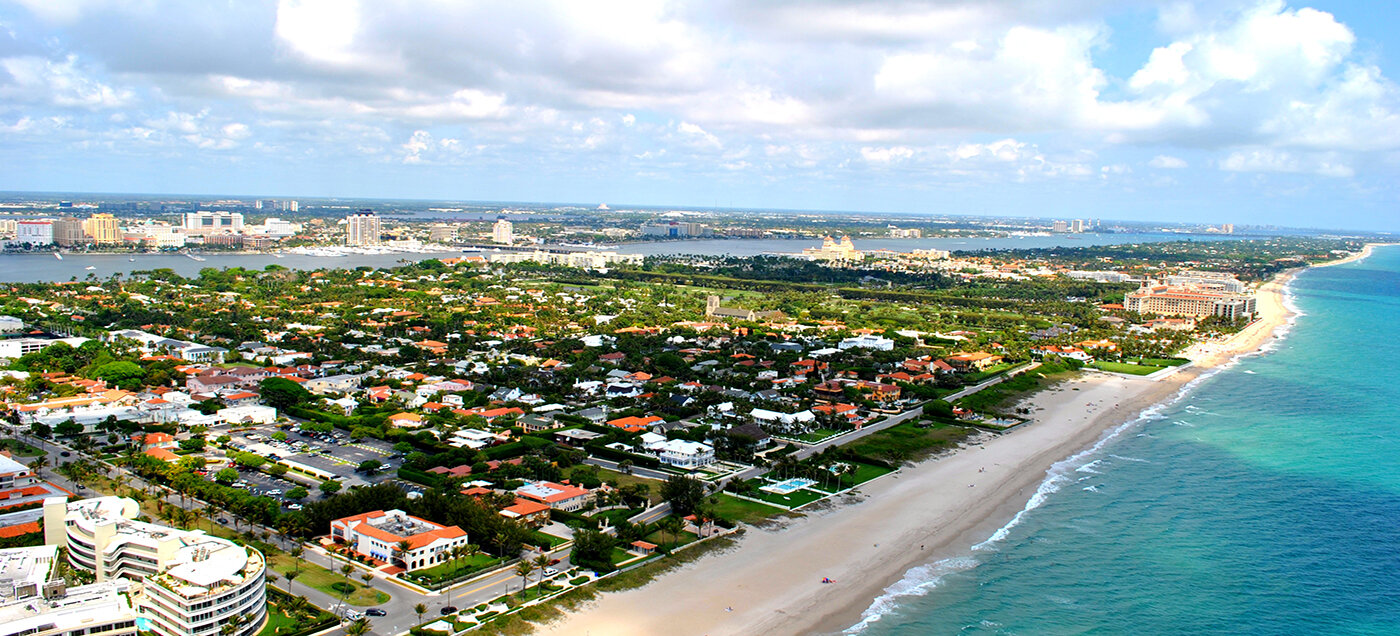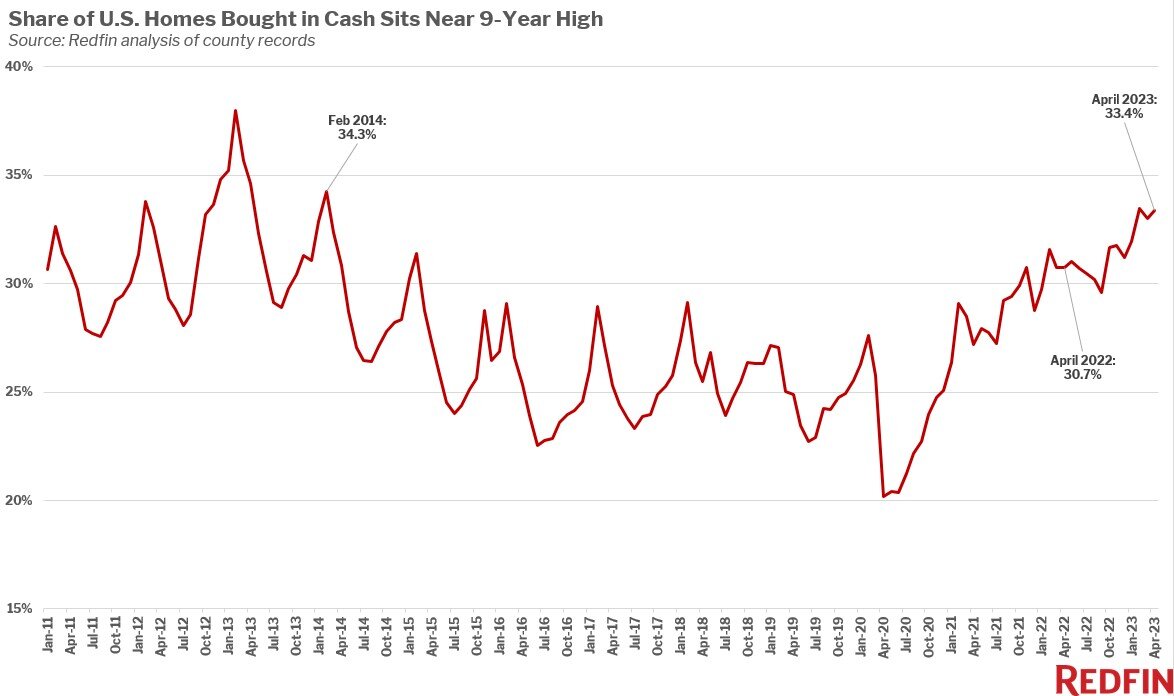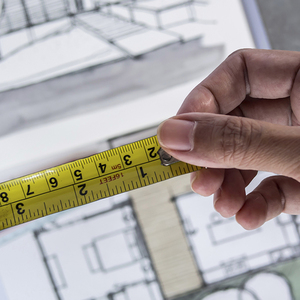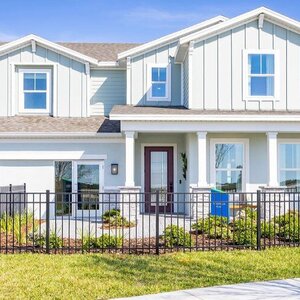Residential Real Estate News

One-Third of All U.S. Homebuyers Paid in Cash in April
Residential News » Palm Beach Edition | By Michael Gerrity | June 12, 2023 9:03 AM ET
The Highest Share of Cash Buyers in Nearly a Decade
Based on new data from national property broker Redfin, one-third (33.4%) of U.S. home purchases were made in cash in April 2023, up from 30.7% a year earlier and the highest share in nine years. That's comparable with February's 33.5% share.
All-cash purchases are making up a bigger portion of the homebuying pie for one major reason: Elevated mortgage rates are deterring homebuyers who take out mortgages more than they're deterring all-cash buyers. Overall home sales were down 41% from a year earlier in April in the metros included in Redfin's analysis, which comprised 40 of the most populous U.S. metros. That's compared with a 35% decline for all-cash sales.
Mortgage rates are near their highest level in 15 years, sidelining many would-be homebuyers--especially those who need to take out a mortgage. But high rates can also deter all-cash buyers because they may decide their money is better spent on investments that benefit from high rates, like bonds.
"A homebuyer who can afford to pay in all cash is weighing two potential paths," said Redfin Senior Economist Sheharyar Bokhari. "They can use cash to pay for the home and avoid high monthly interest payments, or take out a loan and pay a high mortgage rate. In that case, they could use the money that would have gone toward an all-cash purchase to invest in other assets that offer bigger returns, which could partly cancel out their high mortgage rate."
"Buyers who can't afford to pay in all cash also have two potential--but different--paths," Bokhari continued. "They can avoid a high mortgage rate by dropping out of the housing market altogether, or they can take on a high rate. That discrepancy is the reason the all-cash share is near a decade high even though all-cash purchases have dropped: Affluent buyers have the choice to pay cash instead of dropping out of the market."
Competition among homebuyers is a smaller but still noteworthy reason for the uptick in all-cash sales. A lack of homes for sale is prompting competition in some metro areas, motivating buyers to make all-cash offers to win homes.
Down payments post one of the biggest drops since start of pandemic
The typical U.S. homebuyer's down payment was $52,500 in April, down 18% from a year earlier. That's the second-biggest drop since May 2020, when the housing market ground to a halt at the start of the pandemic (the biggest was a 22% drop in March 2023). Down payments have been falling on a year-over-year basis since November.
In percentage terms, the median down payment was equal to 13.1% of the purchase price, down from 16.5% a year earlier.
Even though the inventory shortage is causing more competition for homes than one might expect given today's relatively tepid demand, the bidding-war rate is much lower than it was a year ago. Forty-six percent of home offers written by Redfin agents faced competition in April, down from roughly 59% a year earlier. Less competition means fewer buyers need to offer a big down payment to prove their financial stability and stand out from the crowd. It also means FHA loans, which require lower down payments, are becoming more prevalent.
The typical U.S. home sold for 4% less in April than a year earlier, and the drop is much bigger in some metro areas. Lower home prices mean lower dollar down payments.
Share of homebuyers using FHA loans hits highest share since before the pandemic
Roughly one in six (16.4%) U.S. mortgaged home sales used an FHA loan in April, the highest share since February 2020, just before the pandemic began. That's up from 10.4% a year earlier; representing the largest year-over-year gain on record.
Just under 7% of mortgaged home sales used a VA loan, down from an eight-year high of 8% in February but up from 5.9% a year earlier.
Conventional loans are the most common type, making up more than three-quarters (76.8%) of mortgaged home sales. But the share of buyers using a conventional loan dropped from 83.7% from a year earlier, the biggest year-over-year decline on record.
Redfin agents in pandemic home buying boomtowns Boise, ID, Austin, TX and Orlando, FL report that they saw an uptick in FHA loans in early spring. But Orlando Redfin agent Nicole Dege said she's noticed a decline in buyers using FHA loans since then as inventory has fallen and competition has ticked up.
High mortgage rates may also make buyers more likely to choose an FHA loan instead of a conventional loan, as FHA rates tend to be slightly lower; the average daily FHA rate was 6.54% on June 6, versus 6.89% for a conventional loan.
Even though FHA loans are becoming more common, the fact that one-third of home purchases are made in cash reflects the unequal nature of today's housing market. Affluent buyers who can afford to pay for a home in cash still have an advantage because not only is it easier to get offers accepted, but they don't have to take on high mortgage rates.
Jumbo loans have become less popular as rates stay elevated
Just 6.1% of mortgaged home sales used a jumbo loan in April, down from 10.6% a year earlier but up from the decade-low of 4.3% hit in January.
Jumbo loans have become less common over the last year as mortgage rates have risen. Elevated rates have pushed some buyers of expensive homes out of the market entirely and pushed some into lower price ranges. Banks are also more hesitant to take potential losses on jumbo loans in the aftermath of this year's bank failures.
Sign Up Free | The WPJ Weekly Newsletter
Relevant real estate news.
Actionable market intelligence.
Right to your inbox every week.
Real Estate Listings Showcase
Related News Stories
Residential Real Estate Headlines
- Las Vegas Area Home Prices Uptick 4.3 Percent Annually in March
- Single-Family Rent Growth in U.S. Trends Upward in 2025
- U.S. Mortgage Rates Tick Down Post Trump Tariffs Commencement
- President Trump's 'Liberation Day' Tariffs Potential Impact on the U.S. Housing and Mortgage Markets
- Baby Boomers Biggest Cohort of U.S. Home Buyers in 2025 as Millennials Decline
- U.S. Monthly Housing Payments Hit Record High in 2025
- U.S. Pending Home Sales Uptick in February
- Global Prime Residential Rent Slowdown Continued in Late 2024
- Ireland Home Price Inflation Hits 8 Year High in Early 2025
- Existing Home Sales in America Uptick in February
- Great Miami Area Residential Sales Decline 15 Percent Annually in February
- Mortgage Rates Uptick in Mid-March, Ending 9-Week Decline in U.S.
- World Property Ventures Builds the Future of Real Estate with New Funding Round
- U.S. Builder Sentiment Declines Amid Economic Uncertainty and Rising Costs
- Black Homeownership Rates in U.S. Enjoy Largest Annual Increase of All Racial Groups
- Wealthy Renters Are Taking Over More of the U.S. Rental Market
- If U.S. Congress Does Not Extend NFIP Soon, Thousands of Daily Home Closings Impacted
- U.S. Mortgage Applications Spike 11 Percent in Early March
- Greater Palm Beach Area Residential Sales Rise in Early 2025
- New Apartments in U.S. Are Leasing at Slowest Pace on Record
- U.S. Mortgage Rates Drop to 4 Month Low in March
- Overall U.S. Mortgage Delinquency Rates Dip in December
- New Tariffs on Canada, Mexico to Impact U.S. Homebuilder Input Costs
- Monaco's Property Market: A Tale of Two Cities
- U.S. Home Purchase Cancellations Surge, 1 in 7 Sales Getting Canceled
- U.S. Pending Home Sales Hit Historic Low in Early 2025
- Greater Miami Area Residential Sales Dip in January
- Governor DeSantis Supports Ending Property Taxes in Florida
- WPV Aims to Become the Berkshire Hathaway of Real Estate Tech
- U.S. Home Sales Slump Continues in January
- Average Americans Spend 38 Percent of Monthly Income on Mortgage Payments
- Switzerland's Safe-Haven Appeal Grows with World's Wealthy Homebuyers
- U.S. Builder Confidence Rapidly Declines in February
- Las Vegas Home Sales Rise 6.7 Percent Annually in January, Condo Sales Dip
- Homebuyer Demand in America Drops to 5-Year Low in Early 2025
- Ownership More Affordable Than Renting in Most U.S. Markets
- The World's First Global Listings Service Launches, Called a GLS
- Home Prices Continue to Rise in 89 Percent of U.S. Metros in Late 2024
- Global Luxury Residential Prices Showed Gradual Improvement in Late 2024
- U.S. Construction Hiring Rate Drops to Lowest Levels in 5 Years






